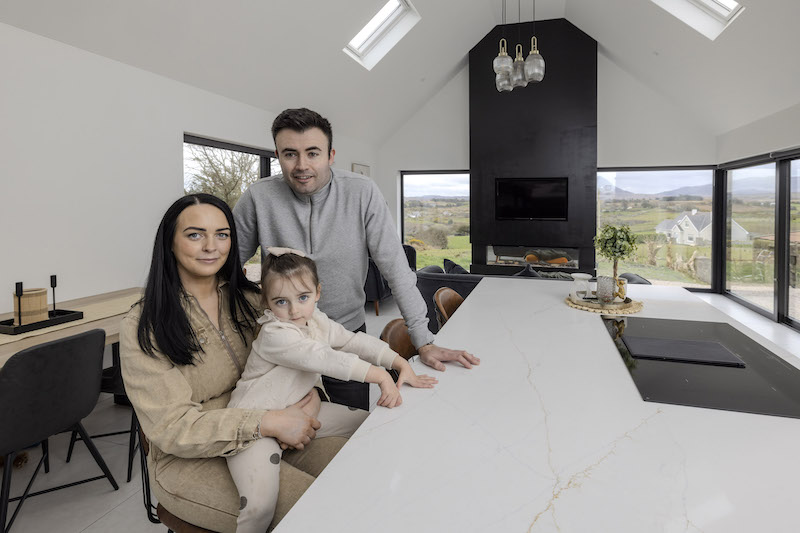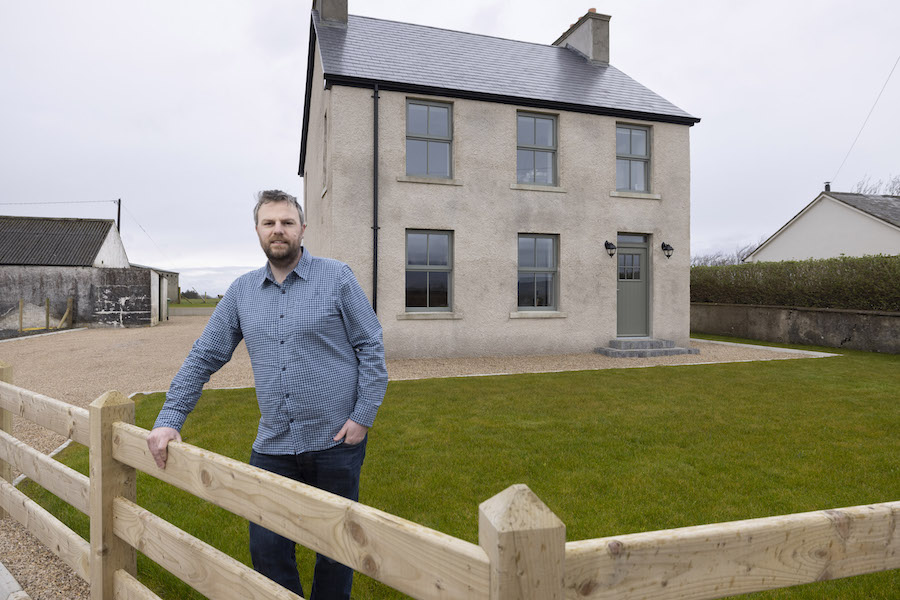There is rarely a week that goes by that a stranger doesn’t knock on Declan Doohan’s two storey refurbished farmhouse on the outskirts of Falcarragh.
The house could so easily be a poster home for the Department of Housing’s Croí Conaithe Scheme.
Aimed at restoring vacant or derelict homes, the scheme is gathering momentum across the country.
And nowhere more than in Donegal which has received 662 applications for such grants, the greatest number in the entire country.
Of those 662 applications, 402 have been approved and 11 have received their grant money with five more pending in the coming days.
Engineer Declan (pictured above) admits there was something of a “romantic notion” about doing up the home his father and 13 other siblings grew up in on Beach Road after it was built around 1935.
The home had been vacant since 2013 and had come into his parents’ possession before he decided to begin renovating it in April, 2022.
Because the house was outside of the town boundary, the house did not initially qualify for a derelict or vacant home grant.
But Declan was delighted when he was later contacted by Donegal County Council to say the guidelines of the scheme had changed and the building did qualify.
Having an architect brother helped immensely even though he was based in Australia.
“We were clear on what we wanted to do and how we wanted to do it including having an open plan space,” he said.
He loves the home and on the odd day he needs to fly to Dublin from nearby Carrickfinn Airport to catch up with colleagues at the company’s offices, he loves nothing more than the thought of being home to see his partner Ann and three daughters aged 5,3 and 1 before bed-time.
He is the essence of remote working and a ‘can do’ attitude which includes following specific guidelines to qualify for a Government grant scheme.
But what of the claims that the scheme is difficult to qualify for or complicated?
Declan said he understands that but that people need to stick with the application and the golden rules are to keep all receipts and to stay on top of all paperwork.
He applied for the vacant home scheme grant which allows up to €50,000 with none of the money being paid until a final inspection is carried out by the local county council.
From the time of all the work being done and the receipts all being submitted, he estimates that it was approximately four months before he received the grant money.
Declan said he has nothing but praise for the scheme and how it is being handled by Donegal County Council.
“It was a little slow at the start but I think the council will be the first to admit that it was new to them also and they were finding their feet with it.
“They always came back to us when we had a question and in many ways we were helping each other.
“I can’t emphasise enough to people who have applied for the scheme to stay on top of their paperwork and to keep all their receipts, vat numbers, etc. After that it’s just a matter of sticking with it,” he said.
He is now only delighted to open the doors to strangers and has recommended the scheme to four or five of his friends who are considering going down the same pathway.
“I always answer the door and show people in. I knocked on enough doors when we were building,” he laughs.
Falcarragh is just one town benefitting from the benefits of the scheme with others towns including Buncrana and Letterkenny also witnessing a rebirthing of homes previously frozen in time.

Blaine and Brídín Mulligan with their daughter, Rúbaí, in their home in Falcarragh, Co. Donegal. Photo by Joe Dunne 04/04/24
Across the other side of the market town which is well-known for its crossroads, Blane Mulligan, his wife Brídín and their two children have also moved into a restored home at Oldtown, also thanks partly to the Croí Conaithe Scheme.
Originally from Leitrim, Blaine is a secondary school teacher in Colaiste Ailigh in Letterkenny while his wife is from Falcarragh.
They inherited the home, which was built in the 1940s and vacant for the past 20 years, from Brídín’s great aunt.
Like Declan Doohan, the Mulligans were also outside the town boundary for the initial scheme but then qualified when they applied and started work on their home in July, 2022.
Blaine explained that some of the work completed on their home was carried out before an initial inspection by the council and this could not be covered under the grant.
The scheme allows for a time period of 13 months for the upgrade works to be completed but councils are expected to be a little flexible in cases.
In his case, Blaine said the experience was very positive but suggested that people would have to be computer literate to get around the scheme at present.
“I don’t think it would suit a lot of older people because a lot of receipts have to be uploaded, etc and I think people would have to be computer savvy.
“That said the council were very responsive and I think there were 80 emails back and forth between ourselves and the council.
“Initially at the start of the process it was a little difficult because the council didn’t know everything themselves but then the Vacant Homes Officer Vincent Cranley came on board and it became much more streamlined,” said Blaine.
As well as renovating the cottage and extending it, the couple brought it up to an A2 energy rating and even installed a geo-thermal heating system.
“The neighbours have said that it’s great to see a light in the old house and I think that’s really nice,” he added.
He also revealed that they did not need a bridging loan while waiting for the €50,00 grant to come through as he had been fortunate to have sold a house which he had previously owned.
Having furnished the council with all their receipts in January, the couple received their grant allocation into their account in mid March.
Vacant Homes Officer with Donegal County Council, Vincent Cranley, said one of the aspects his team are working on is getting the processing time down when all the receipts are handed in and the final inspection takes place.
He is now in his position around a year after current Town Generation Officer Patricia McIntyre paving the way on the scheme before that.
He estimates they now have it down to between six and eight weeks.
He suggests that anybody thinking of applying for the scheme to research it carefully in advance of applying so they know what to expect and what is expected of them.
He stresses the importance of people gathering receipts for work and that anyone employed to do work on homes must be tax registered and compliant and that the applicant must be the legal owner of the house.
Donegal’s islands qualify for greater grants because of the issues surrounding transport of materials, etc.
In the case of vacant homes, homebuilders can qualify for up to €60,000 while home with structural defects can benefit for a grant up to €84,000.
Cranley adds that the council genuinely wants to help people to access the scheme and will help them along as much as possible and assist in any way they can
“We even have a system where we send out a spread-sheet to people to track their costs and to compliment the process.
“We want this scheme to work and it is now showing real signs that it is doing that,” he said.







